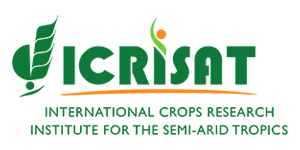Cause Area
Primary Sectors
Geographies Served
Programs
-
Accelerated Crop Improvement
The Accelerated Crop Improvement Program at ICRISAT focuses on developing drought-resistant crop varieties for Africa, Asia, and beyond. By employing advanced technologies like genomics-assisted selection, gene editing, and speed breeding, the program accelerates the development of crops with higher yields, improved nutritional quality, and enhanced resilience to climate change. It also works on establishing sustainable seed systems in India and Africa to ensure farmers have access to improved seeds. The program emphasizes a landscape-level, crop-systems approach, integrating intercropping, multicropping, and regenerative agriculture to support sustainable livelihoods and improved nutrition.
-
Resilient Farm and Food Systems
The Resilient Farm and Food Systems Research Program focuses on sustainable agricultural practices and innovative livelihood strategies. It aims to enhance land and water management through regenerative, low-carbon landscapes, while improving soil health for climate adaptation and mitigation. The program emphasizes resilient farming systems, integrating crops, livestock, and agroforestry for diversification, risk management, and income generation. It leverages climate information services, ICT, and digital innovations to support farmers in decision-making and mechanize agricultural value chains. By using geospatial and big data science, the program builds resilient dryland systems and provides early warnings for extreme weather, pests, and diseases.
Registration Details
-
Registration Number
UI/222(66)/71
-
CSR Form 1
Not Available
-
FCRA
Not Available
About
-
Headquarters
Patancheru, Telangana
-
Since
1972
Impact
ICRISAT's work has helped over 25 million smallholder farmers in 13 countries improve crop yields, incomes and food security through the development of 266 improved legume varieties and distribution of nearly half a million tons of seed.
Vision and Mission
ICRISAT's vision is a prosperous, food-secure and resilient dryland tropics. Its mission is to reduce poverty, hunger, malnutrition and environmental degradation in the dryland tropics.
Political & Religious Declarations
-
Political Affiliation
-
Religious Affiliation
Location
-
Offices in Cities
Delhi
Other Details
-
Type
Non-profit
-
Sub Type
Trust
Technology Adoption
-
SOC 2 Compliant
No
-
Financial Management
-
Beneficiary Management

